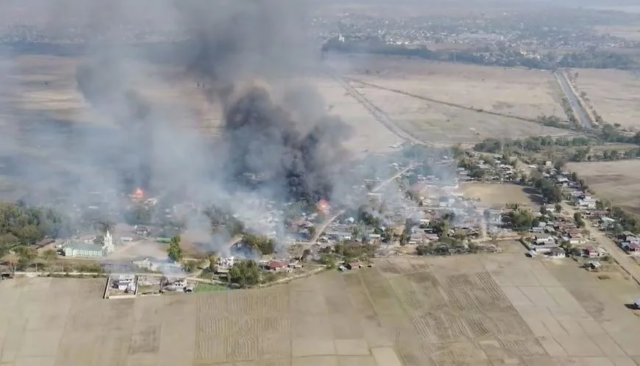Myanmar: UN Rights Body Should Advance Justice
18 March 2022


Smoke rises from burning buildings in Karenni (Kayah) State, Myanmar, February 18, 2022. © 2022 Free Burma Rangers via AP
Support Arms Embargo, Stronger Targeted Sanctions
(Geneva) – The United Nations Human Rights Council should adopt a strategy for accountability in Myanmar to end abuses by the military junta, Human Rights Watch said today. The council will discuss Myanmar and the new report by the UN Human Rights Office at its meeting on March 21, 2022.
The Human Rights Council resolution should call for all UN member states to prevent the flow of weapons into Myanmar and impose stronger, targeted economic sanctions against individuals implicated in abuses and military interests. The resolution should also urge the UN Security Council to refer Myanmar to the International Criminal Court.
“The UN Human Rights Council should respond to Myanmar’s human rights and humanitarian crisis with urgency and purpose,” said Lucy McKernan, deputy UN advocacy director at Human Rights Watch. “The rights council should take strong action against security forces that have never faced consequences for their numerous crimes.”
Since the February 1, 2021, coup, Myanmar’s junta has carried out a brutal nationwide crackdown to suppress those opposing military rule. The junta’s systematic and pervasive abuses, including mass killings, torture, arbitrary arrests, and indiscriminate attacks on civilians, amount to crimes against humanity and war crimes.
The UN Office of the High Commissioner for Human Rights condemned Myanmar security forces’ violations of international human rights and humanitarian law in a March 15 report, stating:
The military and security forces have shown a flagrant disregard for human life, bombarding populated areas with airstrikes and heavy weapons and deliberately targeting civilians, many of whom have been shot in the head, burned to death, arbitrarily arrested, tortured or used as human shields.
In recent weeks, there have been increasing reports of Myanmar military airstrikes and use of heavy weapons causing civilian loss of life and property. The UN special rapporteur on human rights in Myanmar, in his February report on government sales of weapons to the Myanmar military, said that jet aircraft, attack helicopters, armored vehicles, light and heavy artillery, missiles, and rockets are being used against civilians. More than 400 of the attacks reported occurred in Sagaing Region in northwestern Myanmar, where most civilian fatalities have recently occurred.
The Human Rights Council, in addition to calling on all UN member countries to prevent the transfer of weapons to Myanmar, should also call for all revenues from oil, gas, timber, and gems that flow to the military and help finance the abuses to be put into an escrow account for the Myanmar people until a democratically elected civilian government is restored.
Since the coup, security forces have killed at least 1,600 people and detained more than 12,000, according to the Assistance Association for Political Prisoners. Over 500,000 people have been internally displaced since the coup, while tens of thousands have fled as refugees to Thailand and India, according to the UN refugee agency, UNHCR.
In many parts of the country, the junta is deliberately blocking aid to populations as a form of collective punishment. The UN estimates that the number of people needing assistance has grown from 1 million before the coup to 14.4 million, including more than 5 million children. About 25 million people, or half the population, are estimated to be below the national poverty line.
Internet shutdowns remain in parts of the country after the junta imposed rolling nationwide shutdowns and blocked access to social media following the coup. Under international human rights standards, internet-based restrictions must be necessary and proportionate. Blanket internet shutdowns are a form of collective punishment that hinder access to information and communications needed for daily life, which is particularly vital during times of crisis.
“Senior General Min Aung Hlaing and other junta leaders have been able to brutally quash protests and dissent with minimal international interference,” McKernan said. “The Human Rights Council should urgently push back against these abuses and lead the international response to protect rights and advance accountability in Myanmar.”
Announcements
28 February 2025
Asian NGO Network on National Human Rights Institutions , CSO Working Group on Independent National Human Rights Institution (Burma/Myanmar)
Open letter: Removal of the membership of the dis-accredited Myanmar National Human Rights Commission from the Southeast Asia National Human Rights Institution Forum

Progressive Voice is a participatory rights-based policy research and advocacy organization rooted in civil society, that maintains strong networks and relationships with grassroots organizations and community-based organizations throughout Myanmar. It acts as a bridge to the international community and international policymakers by amplifying voices from the ground, and advocating for a rights-based policy narrative.